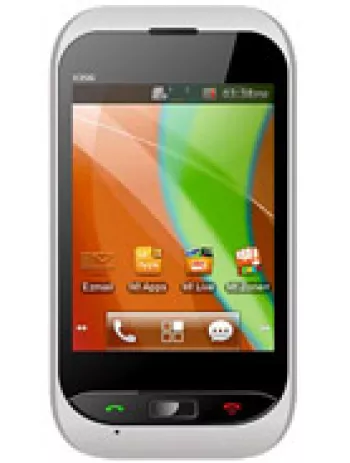
Overview of Micromax A73
The Micromax A73 is an early entrant in the Android smartphone market, released in 2011. This device was designed to cater to users seeking an entry-level Android experience. While it has since been discontinued, the A73 offers insights into the technological capabilities and market demands of its time.
Design and Build
The Micromax A73 boasts a compact design with dimensions of 108 x 62 x 12 mm, making it easy to hold and operate with one hand. The phone features a classic look with a black finish, which was quite standard for smartphones of that era. It supports Dual SIM (Mini-SIM), enabling users to manage two numbers simultaneously, a feature that was particularly advantageous for separating work and personal life.
Display
The device is equipped with a 3.5-inch TFT display, which supports 256K colors. The screen resolution of 320 x 480 pixels, resulting in a ~165 ppi density, offers a basic yet functional viewing experience suitable for browsing, messaging and simple apps. While not as sharp or vibrant as modern displays, it sufficed for the smartphone needs of its target demographic.
Performance
Under the hood, the Micromax A73 is powered by the MediaTek MT6573 chipset coupled with a 650 MHz Cortex-A9 CPU. It features a PowerVR SGX531 GPU, which enables basic graphic rendering tasks. With 256 MB of RAM and 512 MB of internal storage, the phone is capable of handling essential applications but struggles with more demanding tasks or multitasking. The microSDHC slot allows for expandable storage, mitigating the limited internal memory to a degree.
Operating System
The A73 runs on Android 2.3 (Gingerbread), an OS that marked a significant improvement in performance and user interface over its predecessors. Key features include support for third-party app installs, enhanced connectivity tools, and a more intuitive interface which contributed to Android's growing popularity at the time.
Camera Capabilities
The main camera of the Micromax A73 is a 2 MP shooter with an LED flash, capable of capturing basic photos and videos. It offers limited functionality compared to contemporary standards, but was adequate for simple snapshots. The VGA front camera is aimed at video calls rather than high-quality selfies.
Battery Life
The phone is equipped with a removable Li-Ion 1300 mAh battery. It offers up to 240 hours of standby time and around 4 hours of talk time on 2G, and up to 5 hours on 3G. These figures indicate that the device was intended for basic use, such as calls and texts, with occasional data use.
Network and Connectivity
The device supports GSM and HSPA technology, with 2G bands on GSM 900 and 1800, and 3G bands on HSDPA 2100. Connectivity options include Wi-Fi 802.11 b/g/n, Bluetooth 3.0 with A2DP for short-range wireless communication, GPS for location services, FM radio for entertainment, and a microUSB 2.0 port for data transfer and charging.
Sound and Multimedia
The A73 comes with a loudspeaker and a 3.5mm headphone jack, supporting standard audio connectivity. These features, combined with its media capabilities, provide a basic multimedia experience suitable for listening to music or radio on-the-go.
Additional Features
An accelerometer sensor is included, which is mainly used to auto-rotate the device's screen orientation. This was a novel feature in early smartphones, enhancing usability particularly for games and applications.
Market Position and Pricing
Priced approximately at 90 EUR during its release, the Micromax A73 positioned itself as an affordable entry-level smartphone. It targeted emerging markets and budget-conscious consumers, especially in regions where smartphone penetration was beginning to grow.
Conclusion
While the Micromax A73 is now discontinued, it serves as a historical piece reflecting the early days of Android smartphones. Offering fundamental functionality, its design catered to users making their first transition from feature phones to smartphones. It demonstrated how budget-friendly devices could incorporate essential smartphone features, contributing to the broader acceptance and democratization of smartphone technology.
Key Features of Micromax A73
- Dual SIM functionality (Mini-SIM)
- 3.5-inch TFT display with 256K colors
- Android 2.3 (Gingerbread) operating system
- Mediatek MT6573 chipset with 650 MHz Cortex-A9 CPU
- Expandable storage via microSDHC card slot
- 2 MP main camera with LED flash and video capability
- VGA front camera for selfies
- Wi-Fi 802.11 b/g/n with hotspot functionality
- Bluetooth 3.0 with A2DP
- GPS for location positioning
- FM radio for entertainment
- Removable Li-Ion 1300 mAh battery with up to 5 hours of talk time on 3G
- Compact design with overall dimensions of 108 x 62 x 12 mm
Micromax A73 Drawbacks
- Discontinued model, no longer available in the market
- Outdated Android 2.3 (Gingerbread) operating system
- Low-performance CPU with only 650 MHz Cortex-A9
- Limited RAM and internal storage (256MB RAM, 512MB internal storage)
- Low-resolution display (~165 ppi density)
- Poor camera quality with 2 MP main camera and VGA selfie camera
- Short battery life with only a 1300 mAh battery
- Limited network technology support (only GSM/HSPA)
- Lack of advanced features such as NFC, fingerprint sensor, or high-speed internet
- Basic sensors available (only accelerometer)
- Heavier and thicker design compared to modern smartphones

View Also
More Phones
All Rights Reserved +14266 Phones © Mobilawy 2025

























